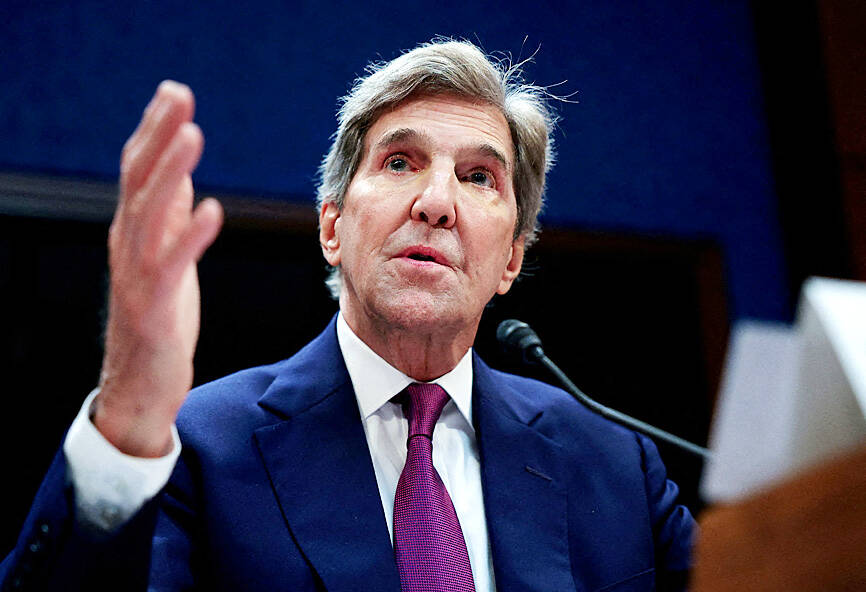US Special Presidential Envoy for Climate John Kerry yesterday arrived in China for three days of talks that would test the ability of the world’s top two greenhouse gas emitters to collaborate in the fight against global warming despite deep discord over other issues.
Kerry’s visit is the latest front in a diplomatic push aimed at re-establishing connections between the superpowers that frayed amid tensions over export controls and human rights, as well as former US House of Representatives speaker Nancy Pelosi’s trip to Taiwan in August last year.
It would also mark the first protracted climate negotiations between the two countries in nearly a year, since Beijing severed consultation on that and other issues in the wake of Pelosi’s visit.

Photo: Reuters
Kerry, a former US secretary of state tapped to be special presidential envoy for climate two years ago, said he is seeking “candid conversations” with Chinese officials and hoping to forge progress in paring releases of potent greenhouse gas methane, while hastening a transition away from coal and deploying renewable power.
“What we want to do is find ways to see if China and the US can advance the cause together for the rest of the world by accelerating rates of doing things, by increasing the deployment of renewables, by improving grid management,” Kerry told a US House of Representatives hearing on Thursday. “If we can make some progress on that, we think we can tampen down this edgy sense of competition which could lead to a mistake which takes you to a place you didn’t mean to go to.”
From today, Kerry and Chinese Special Envoy on Climate Change Xie Zhenhua (解振華) are to have an “in-depth” exchange of views on cooperation to deal with climate change, China’s state broadcaster China Central Television reported, confirming Kerry’s plane had landed in Beijing.
Experts in climate diplomacy cautioned against expectations for any significant breakthrough.
“A critical thing to observe in this visit if there are further steps envisioned, what those steps are, and how explicit the steps will be laid out by both sides,” said Li Shuo (李碩), a policy adviser for Greenpeace East Asia.
The trip might not “resolve anything on paper immediately,” but it could lay a foundation for future statements or commitments, he said.
The restart of US-China climate talks comes on the heels of the hottest week on record globally, according to the World Meteorological Organization.
June was already the hottest ever logged, according to US and European agencies.
Additional reporting by AFP

SECURITY: As China is ‘reshaping’ Hong Kong’s population, Taiwan must raise the eligibility threshold for applications from Hong Kongers, Chiu Chui-cheng said When Hong Kong and Macau citizens apply for residency in Taiwan, it would be under a new category that includes a “national security observation period,” Mainland Affairs Council (MAC) Minister Chiu Chui-cheng (邱垂正) said yesterday. President William Lai (賴清德) on March 13 announced 17 strategies to counter China’s aggression toward Taiwan, including incorporating national security considerations into the review process for residency applications from Hong Kong and Macau citizens. The situation in Hong Kong is constantly changing, Chiu said to media yesterday on the sidelines of the Taipei Technology Run hosted by the Taipei Neihu Technology Park Development Association. With

A US Marine Corps regiment equipped with Naval Strike Missiles (NSM) is set to participate in the upcoming Balikatan 25 exercise in the Luzon Strait, marking the system’s first-ever deployment in the Philippines. US and Philippine officials have separately confirmed that the Navy Marine Expeditionary Ship Interdiction System (NMESIS) — the mobile launch platform for the Naval Strike Missile — would take part in the joint exercise. The missiles are being deployed to “a strategic first island chain chokepoint” in the waters between Taiwan proper and the Philippines, US-based Naval News reported. “The Luzon Strait and Bashi Channel represent a critical access

CARROT AND STICK: While unrelenting in its military threats, China attracted nearly 40,000 Taiwanese to over 400 business events last year Nearly 40,000 Taiwanese last year joined industry events in China, such as conferences and trade fairs, supported by the Chinese government, a study showed yesterday, as Beijing ramps up a charm offensive toward Taipei alongside military pressure. China has long taken a carrot-and-stick approach to Taiwan, threatening it with the prospect of military action while reaching out to those it believes are amenable to Beijing’s point of view. Taiwanese security officials are wary of what they see as Beijing’s influence campaigns to sway public opinion after Taipei and Beijing gradually resumed travel links halted by the COVID-19 pandemic, but the scale of

Pope Francis is be laid to rest on Saturday after lying in state for three days in St Peter’s Basilica, where the faithful are expected to flock to pay their respects to history’s first Latin American pontiff. The cardinals met yesterday in the Vatican’s synod hall to chart the next steps before a conclave begins to choose Francis’ successor, as condolences poured in from around the world. According to current norms, the conclave must begin between May 5 and 10. The cardinals set the funeral for Saturday at 10am in St Peter’s Square, to be celebrated by the dean of the College